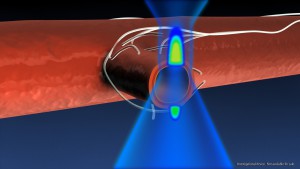 Four patients in Birmingham are the first in the UK to be recruited onto a trial for a one-hour treatment which could prove ‘life-changing’ for the estimated 8% of adults in the West Midlands living with a constant risk of a stroke or severe coronary event.
Four patients in Birmingham are the first in the UK to be recruited onto a trial for a one-hour treatment which could prove ‘life-changing’ for the estimated 8% of adults in the West Midlands living with a constant risk of a stroke or severe coronary event.
Patients living with a severe form of high blood pressure called uncontrolled hypertension – which means they have high blood pressure that is not controlled with drug therapy – are being recruited onto the trial by Dr Indranil Dasgupta at Heartlands Hospital, part of Heart of England NHS Foundation Trust.
The treatment is the subject of a randomised clinical trial known as WAVE IV. In previous trials, three quarters of treated patients experienced a meaningful reduction in their blood pressure following the one-time, one-hour therapy. The first four patients were seen at the hospital on May 6 – further procedures on the trial are scheduled to take place at Heartlands in August.
Patients may be eligible to participate in the WAVE IV Clinical Study if:
- They are aged between 18 years of age and 90 years of age.
- Their systolic blood pressure (top number) is greater than 160 mmHg.
- They are currently taking three or more prescription medications for high blood pressure.
Resistant hypertension is a severe type of high blood pressure and is defined by a lack of response to three or more drugs. Patients with resistant hypertension may or may not have symptoms and have a significantly increased risk of dying of cardiovascular disease or stroke.
People with hypertension may have overactive renal (kidney) nerves, a condition that raises blood pressure and contributes to heart, kidney and blood vessel damage. The Surround Sound® Hypertension Therapy System uses non-invasive ultrasound to treat hyperactive renal nerves (a technique called renal denervation (RDN). This is intended to cause a reduction in the kidney’s production of hormones that raise blood pressure and may also protect the heart, kidneys and blood vessels from further damage.
The WAVE IV clinical trial is evaluating Surround Sound Hypertension Therapy for patients with severe resistant hypertension. Surround Sound is the only non-invasive renal denervation treatment for resistant hypertension of its type: other treatments rely on a catheter inside the body emitting energy to treat the renal nerves, while Surround Sound® delivers ultrasound energy to the nerves from outside the body without any cutting or incisions.
Dr Dasgupta, Consultant Nephrologist, the Principal Investigator at Heartlands Hospital, said: “Surround Sound therapy may target the renal nerves more accurately than catheter-based renal denervation – this may be why previous trials of renal denervation treatments have not been as effective as we hoped. Importantly, Surround Sound is unique in that it is also non-invasive which is important to patients – who wants to have a catheter placed in their groin? It also means they don’t have to be admitted to hospital and stay in overnight – unlike other similar treatments.
“For me as a doctor, it is a frustrating situation that I am not able to adequately treat a good proportion of my patients with resistant hypertension. We estimate these patients make up around 10-12% of all British people with high blood pressure. The Surround Sound treatment has the potential to benefit many hundreds of thousands of patients and may well be what doctors like me have been waiting for, for many years.”
If you think you could be eligible to take part in the trial please call 0121 4243161 or 0121 4242158.






